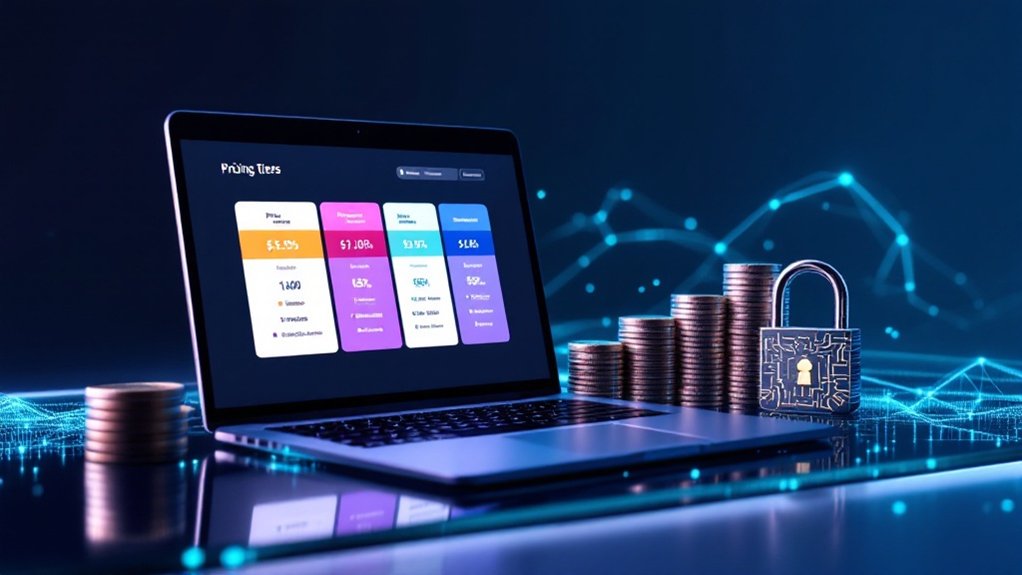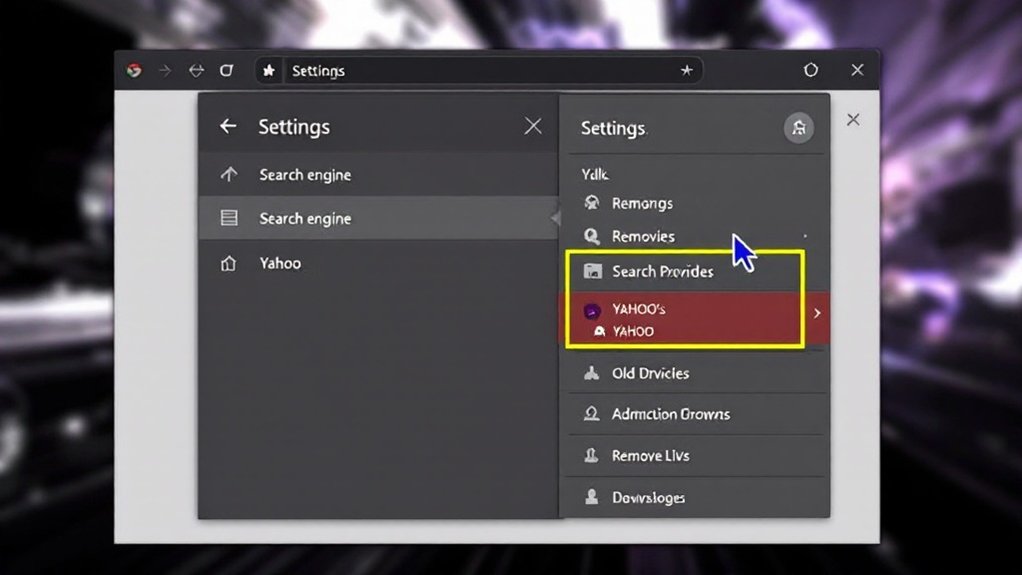VPN services range from $3 to $18 per month, with annual subscriptions offering substantial savings between $40 and $100. Leading providers like ExpressVPN ($13/month) and NordVPN ($60/year) deliver premium features including AES-256 encryption and unlimited data. Though free VPNs exist, they often impose restrictions and may compromise privacy through data monetization. Business solutions from AWS and Azure follow different pricing models, starting at $0.05 per hour. Understanding the full spectrum of VPN options reveals the most cost-effective security solutions.

As the growing demand for online privacy has made VPN services increasingly essential, maneuvering their complex pricing structures remains a challenge for many consumers. The current market offers various subscription models, with monthly plans typically ranging from $3 to $18, as annual subscriptions average between $40 and $60 per year. Long-term commitments, particularly two-year plans, often reduce monthly costs to $2-$4, presenting substantial savings for users willing to commit to extended periods. Many providers offer risk-free trials to help users evaluate their services before making a long-term commitment.
Leading providers in 2025 demonstrate this pricing variance, with ExpressVPN commanding $13 monthly or $100 annually, as NordVPN offers comparable monthly rates but reduces its annual fee to $60. Surfshark positions itself competitively at $15 monthly, dropping to $48 for yearly subscriptions, as CyberGhost and Private Internet Access maintain similar pricing structures with various term options.
VPN market leaders showcase diverse pricing, from ExpressVPN’s premium rates to Surfshark’s budget-friendly options, reflecting varied approaches to subscription costs.
The distinction between free and paid VPN services proves significant regarding functionality and security. Although free options exist, they frequently impose data caps, speed limitations, and may monetize user data to sustain operations. Premium services, typically priced between $5 and $10 monthly, provide improved security features, broader server networks, and reliable customer support systems. Users should prioritize services featuring AES-256 encryption for maximum data protection.
Enterprise solutions present a different pricing paradigm altogether, with providers like AWS charging $0.05 per hour for Site-to-Site VPN services, as Azure VPN Gateway costs range from $26 to $912 monthly. These business-oriented solutions often include specialized support and service level agreements, reflecting their advanced capabilities and reliability requirements.
Cost-conscious consumers can employ several strategies to maximize their VPN expenditure, including selecting longer subscription terms, monitoring seasonal promotions, and utilizing educational or group discount programs.
The relationship between price and features typically correlates directly, with higher-priced services offering advanced security protocols, faster connection speeds, and more extensive server networks. Industry standards indicate that ideal value often lies in annual subscriptions from reputable providers, balancing cost efficiency with strong security features and reliable performance.
Frequently Asked Questions
Can I Share My VPN Subscription With Family Members?
Most VPN services allow family sharing through dedicated family plans, typically supporting 5-10 simultaneous device connections.
Popular providers like Surfshark offer unlimited connections, whereas others facilitate router-level VPN setup to cover all household devices.
Users should consider bandwidth limitations, potential privacy concerns between family members, and streaming service restrictions.
Implementation of strong passwords, two-factor authentication, and regular device management remain vital for secure family sharing.
Do VPNS Offer Student or Military Discounts?
Many VPN providers offer substantial discounts for students and military personnel.
Students aged 18-26 can access discounts ranging from 15% to 79%, with providers like Surfshark and CyberGhost offering the highest savings on long-term plans.
Military members typically receive 15-30% off regular subscription prices.
These discounts require verification through educational email addresses, Student Beans platform, or valid military documentation before being applied at checkout.
Why Are Lifetime VPN Subscriptions Usually a Red Flag?
Lifetime VPN subscriptions typically indicate an unsustainable business model that cannot support ongoing server maintenance, security updates, and infrastructure improvements.
These services often lack the recurring revenue needed to maintain strong security protocols, conduct regular audits, or invest in new technologies.
Many lifetime VPN providers eventually shut down operations, sell user data to recoup costs, or compromise on crucial security features, leaving subscribers vulnerable to cyber threats and data breaches.
What Payment Methods Do VPN Providers Typically Accept?
VPN providers typically accept traditional payment methods including credit cards, debit cards, and bank transfers.
Digital wallets like PayPal, Apple Pay, and Google Pay are commonly supported, whereas cryptocurrency options such as Bitcoin and Ethereum provide improved privacy.
Many services additionally accommodate alternative payment methods, including gift cards, retail store payments, and mobile carrier billing, with cryptocurrency acceptance expanding considerably among privacy-focused providers.
How Often Do VPN Services Run Promotional Sales or Special Offers?
VPN services typically run promotions throughout the year, with major sales concentrated around Black Friday, Cyber Monday, and New Year’s.
Most providers offer 3-4 significant seasonal discounts annually, as they conduct periodic flash sales lasting 24-72 hours.
Premium VPN companies frequently provide special offers during product launches, company anniversaries, and back-to-school periods, with discounts ranging from 50% to 90% off standard subscription rates.









